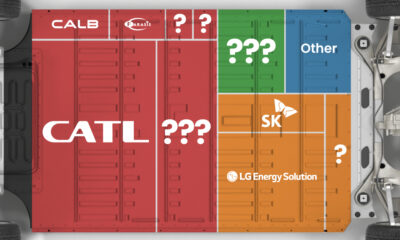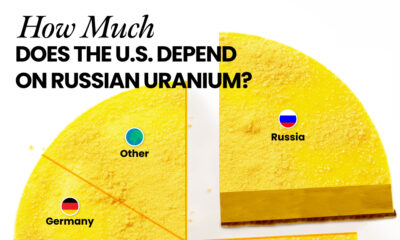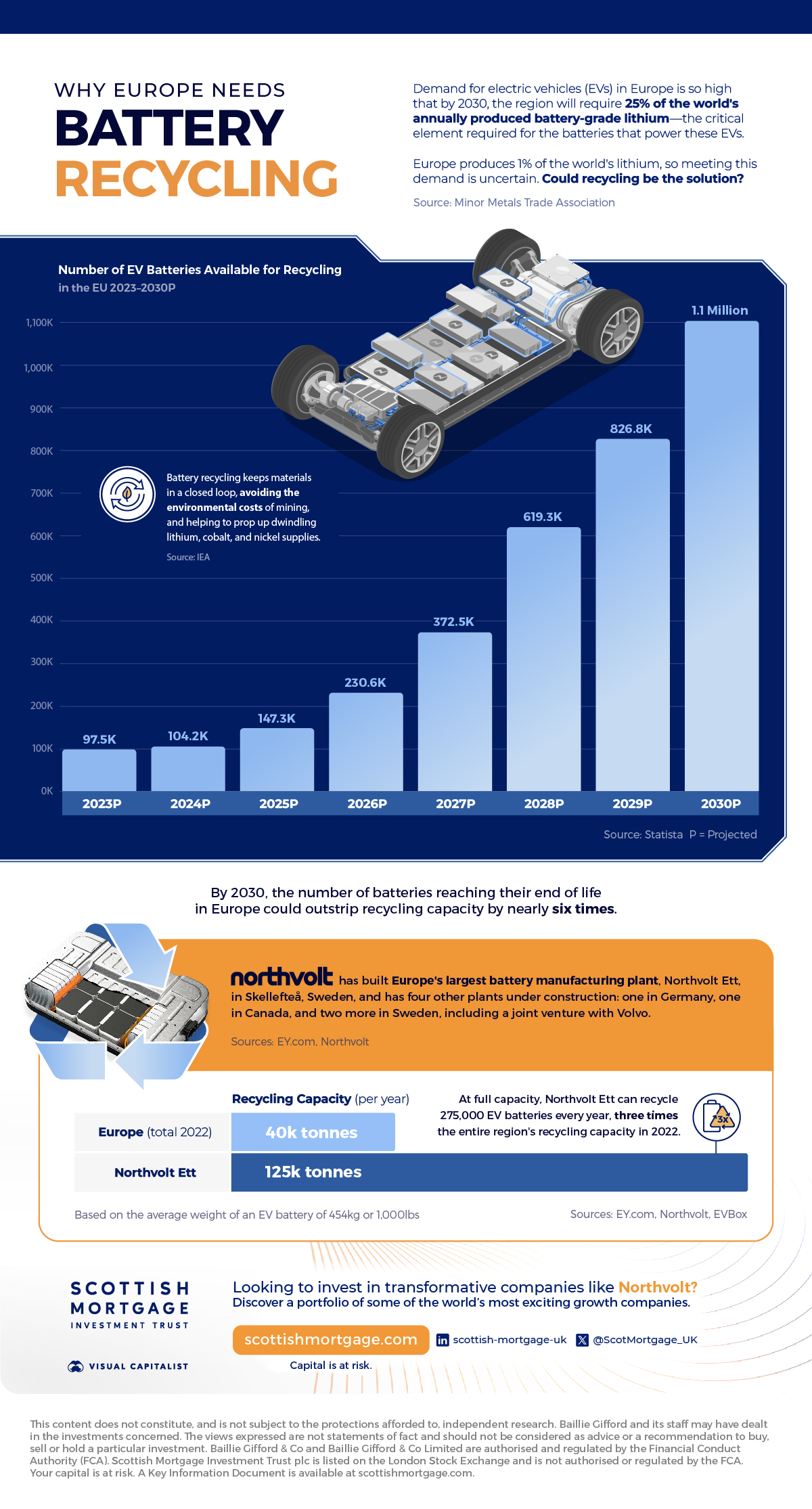Visualised: Europe’s Battery Recycling Challenge
Solving Europe’s Battery Recycling Puzzle
The demand for EVs in Europe is so high that by 2030, the region will demand 25% of the world’s annually produced battery-grade lithium, the critical element required to power these EVs.
However, as the region produces only 1% of the world’s lithium, Europe must find a new way to meet this demand.
In this graphic, sponsored by Scottish Mortgage, we will explore a solution to this puzzle—battery recycling.
A Mountainous Problem
By 2030, over a million EV batteries will reach end-of-life in Europe. As you can see, the issue isn’t confined to 2030 alone:
| Year | Number of EV Batteries Available for Recycling in the EU |
|---|---|
| 2018 | 0.9K |
| 2019 | 8.3K |
| 2020 | 17.2K |
| 2021 | 37.9K |
| 2022 | 50.6K |
| 2023P | 97.5K |
| 2024P | 104.2K |
| 2025P | 147.3K |
| 2026P | 230.6K |
| 2027P | 372.5K |
| 2028P | 619.3K |
| 2029P | 826.8K |
| 2030P | 1,103.8K |
A Clean Solution
Battery recycling offers a clean solution to the mountain of batteries Europe will use yearly, as it can recover as much as 95% of a battery’s lithium.
Moreover, battery recycling keeps materials in a closed loop, allowing the region to avoid the environmental costs of mining and help prop up the dwindling lithium supply and taxed cobalt and nickel supply.
However, Europe needs a plan to deal with this waste. With a current battery recycling capacity of only 40,000 tonnes per year, the volume of batteries reaching their end of life in Europe by 2030 will be over 25 times higher than its current recycling capacity.
Enter Northvolt
Battery manufacturer Northvolt is tackling this challenge head-on by operating Northvolt Ett, Europe’s largest battery recycling plant in Skellefteå, Sweden, on the edge of the Arctic Circle.
The Northvolt Ett plant boasts an impressive recycling capacity of 125 kilotonnes annually.
Meaning that when working at total capacity, it could increase Europe’s battery recycling capacity by nearly 50%, while still recycling 95% of lithium and 95% of other materials critical to battery production: nickel, manganese, and cobalt.
Northvolt is expanding its global operations by constructing four new factories. One is in Heide, Germany, and another is in Québec, Canada. The remaining two factories are under construction in Borlänge and Gothenburg, Sweden. The latter is a joint venture between Northvolt and Volvo.
Scottish Mortgage exposes investors to the growing battery recycling industry through companies like Northvolt.

Discover how to invest in some of the world’s most innovative companies with Scottish Mortgage today.

-

 Energy1 week ago
Energy1 week agoWho’s Building the Most Solar Energy?
China’s solar capacity triples USA, nearly doubles EU.
-

 Energy2 weeks ago
Energy2 weeks agoMapped: The Age of Energy Projects in Interconnection Queues, by State
This map shows how many energy projects are in interconnection queues by state and how long these projects have been queued up, on average.
-

 Energy3 weeks ago
Energy3 weeks agoRanked: The Top 10 EV Battery Manufacturers in 2023
Asia dominates this ranking of the world’s largest EV battery manufacturers in 2023.
-

 Energy4 weeks ago
Energy4 weeks agoThe World’s Biggest Nuclear Energy Producers
China has grown its nuclear capacity over the last decade, now ranking second on the list of top nuclear energy producers.
-

 Energy2 months ago
Energy2 months agoThe World’s Biggest Oil Producers in 2023
Just three countries accounted for 40% of global oil production last year.
-

 Energy2 months ago
Energy2 months agoHow Much Does the U.S. Depend on Russian Uranium?
Currently, Russia is the largest foreign supplier of nuclear power fuel to the U.S.

